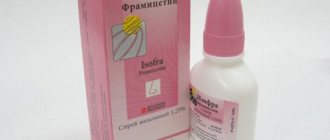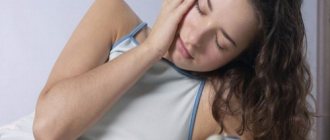Pharmacological action of Isofra
The medicine, presented in the form of a spray, is available in plastic bottles with a capacity of 15 milliliters, packed in cardboard boxes. The drug has an antibacterial effect and is injected into the nose to destroy the infection.
Isofra is a local drug aimed at the symptomatic treatment of diseases of the ENT organs. It destroys pathogenic microorganisms. Thanks to the main active ingredient - framycetin (belongs to the antibacterial drugs of the aminoglycoside series), the symptoms of the disease disappear. After topical application of Isofra, the concentrations of framycetin necessary for treating the disease appear on the mucous membrane of the patient’s nose and sinuses.
This drug effectively destroys bacteria. It copes with both gram-negative and gram-positive microbes that infect the upper respiratory tract. Resistance (lack of sensitivity to the product in bacteria) is low.
A small amount of medication is absorbed into the body.
There is practically no development of resistance to framycetin.
Pharmacological action and use for sinusitis
The main active ingredient of the drug belongs to the group of aminoglycosides. The spray is effective for various types of runny nose, as well as after operations on the nasopharynx.
The medicine has an active bactericidal effect on bacteria such as:
- Staphylococcus,
- Gram-negative and gram-positive bacteria,
- E. coli.
The product has no effect on anaerobic infections and streptococci.
The composition of the product includes such substances as: the main substance - pharmacetin sulfate and auxiliary: sodium chloride, methyl parahydroxybenzoate, distilled water, citric acid. The product is available in the form of a nasal spray, in packages of 15 ml. The permissible shelf life of the drug is three years. The recommended temperature is no higher than 25 degrees. The cost of the medicine ranges from three hundred to four hundred rubles.
The medicine is a nasal spray with antibacterial action. Despite the fact that it is an antibiotic, it has virtually no side effects, except for a small risk of allergies. There is no addiction to the antibiotic, as it almost does not enter the body and has a local effect.
The use of isofra for sinusitis helps in the following ways:
- Swelling of the maxillary sinuses is reduced,
- The accumulation of pus in the maxillary sinuses is reduced,
- Reduces the likelihood of scar formation,
- Pathogenic bacteria are destroyed
- Blood pressure decreases and pain syndrome decreases.
In some cases, the standard course of treatment may last several weeks.
How to take Isofra for various forms of sinusitis?
If the patient has symptoms of sinusitis, it should be used in the following dosages:
- adults do one injection every 4 - 6 hours;
- children should take one injection 3 times a day.
However, the otorhinolaryngologist must take into account the individual health characteristics of the patient, so the dosage in some cases may differ from the “standard” one.
Treatment usually lasts 7-10 days. However, in complex cases, combination therapy is necessary. Then the doctor prescribes Isofra as a local remedy and antibacterial drugs in tablets, for oral administration, or by injection.
If the patient's condition does not improve, the drug is discontinued and another one is prescribed.
In addition to sinusitis, Isofra is used for rhinitis and nasopharyngitis, as well as sinusitis. It is also recommended after nasal surgery to prevent wound infection.
To ensure that the medicine gets into the nose, the bottle is held vertically.
Also, you cannot interrupt the course of treatment. If a specialist advised taking it for 7 days, you need to be treated for a week, even if the patient’s condition improves on the third or fourth day. It is important not to “heal” the disease, but to completely cure it. Otherwise, the patient may develop complications. For example, the infection will become resistant to antibiotics and the inflammation will become chronic.
Use of the drug in children
Children can use Isofra, but the daily number of injections is reduced compared to adult patients. The doctor has the right to prescribe the drug to a child over one year old.
Isofra during pregnancy
The medicine is not recommended for pregnant and lactating women. Its use negatively affects the formation of the inner ear in the fetus. In addition, the drops are intended for patients older than 1 year, so the baby should not be allowed to receive Isofra with the milk of the mother being treated. It is better to ask the doctor to prescribe another remedy.
Use of the drug
Once again, we emphasize to patients that they should not self-medicate, which can lead to serious complications. Treatment should be carried out by a qualified physician.
Many otolaryngologists advocate a wait-and-see approach. It lies in the fact that within 5-7 days the viral infection should go away on its own. If antiviral drugs are used, symptoms disappear within 3-4 days. If antiviral drugs do not cope within 3-4 days, antibiotics are prescribed - Isofra, Bioparox.
The drug is used intranasally. Holding the bottle vertically, the spray is injected into each nostril (1 injection 4-5 times for adults, 3 times for children). Isofra can be used for no more than 10 days. In case of longer use, the natural microflora of the nasopharynx is disrupted.
Use during pregnancy
The use of any medications during pregnancy should be agreed with your doctor.
During pregnancy, the use of absolutely any drug must be agreed with a doctor, especially the use of antibacterial agents. Isofra for sinusitis is prescribed by a doctor only when the benefit will significantly outweigh the potential risk to the health of the fetus and woman.
There is currently no reliable information that Isofra in any way affects the intrauterine development of the fetus and the course of pregnancy. However, it should be taken into account that this is an antibacterial drug.
Use in childhood
An important advantage of the drug can be considered the possibility of use in childhood, starting from 1 year. Many pediatricians prescribe Isofra for the treatment of sinusitis in children. In addition, the spray form is very convenient to use even for the smallest patients.
It is worth noting that the antibacterial drug is prescribed after passing the necessary tests at the time the bacteria are sensitive to the active substance of the antibiotic. When used rationally as prescribed by a doctor, Isofra does not pose a threat to the child’s health, but shows very effective results.
It is not recommended to self-prescribe antibiotics to your children. In rare cases, a drug prescribed by a doctor does not have a positive result. You should not wait 10 days and you should immediately report the lack of improvement to your doctor. Most likely, the doctor will change the treatment tactics and prescribe another drug.
Analogues of Isofra
Patients seek to save money, and sometimes Isofra causes side effects. What to do? That's right, replace it with analogues! Instead of Isofra, doctors recommend:
Polydex (also spray in 15 ml bottles). Cures runny nose and sinusitis, but is dangerous for hypertensive patients, allergy sufferers, people with glaucoma and a tendency to seizures and convulsions. Not used in combination with sympathomimetics and monoamine oxidase inhibitors.
Sialor (based on two percent protargol). Silver with polyvinyl-N-pyrrolidone. Contraindicated during pregnancy, lactation and allergies to active ingredients.
Oily Chlorophyllipt. Two percent solution in 20 ml bottles. Doctors prescribe it to adult patients, except women during pregnancy or breastfeeding. There is no experience in using Chlorophyllipt in children, so the issue of its use should be decided together with a pediatric otolaryngologist.
Collargol. The active substance is silver. Doctors prescribe Collargol not only against diseases of the ENT organs, but also for sexually transmitted diseases, infections of the genitourinary system and skin problems. However, the treatment affects the color of the patient’s skin and eyes, so silver preparations are undesirable if a person’s work requires an impeccable appearance. This applies to singers, actors, teachers, etc.
Octenisept (solution in 0.05 l containers) - suitable even for small children and pregnant women. The main components are phenoxyethanol and octenidine dihydrochloride. Effectively destroys pathogenic microorganisms.
Bactroban nasal ointment with the active substance mupirocin. Bactroban is a broad-spectrum drug because it is suitable for treating scratches and cracks in the skin and even for treating nipple injuries in nursing mothers. It is safe during pregnancy, so it can be an option for treating sinusitis in an expectant mother.
Okomistin drops, used mainly in ophthalmology (for conjunctivitis and keratitis). But with its help, they successfully eliminate the symptoms of inflammation in the nasal cavity, sinuses and ears. Experts recommend it for both children and adults. Safe for expectant mothers and infants.
Miramistin is a 0.01% solution in 50 milliliter bottles. It is not recommended for children, but women can be treated with this solution during pregnancy.
Fusafungine-based aerosol Bioparox (packs of 10 ml) - it is also suitable for irrigating the throat with sore throat. Good for patients older than 2.5 years. It is not recommended for infants, since there is no experience in treating such young children with Bioparox and other dosage forms of fusafungine.
Isofra or Polydex?
The difference in cost between Isofra and Polydex is small. Isofra costs, on average, 329 rubles, and Polydexa costs 320 rubles. Therefore, the choice of drug should be entrusted to the attending physician. Self-medication and experiments with medications are unacceptable. It is important to know the particularities of the course of the disease and the health of the person being treated.
Polydexa, unlike Isofra, includes two components: neomycin sulfate and polymexin B sulfate. Children at least 2.5 years old can be treated with this drug. Polydexa has more side effects, but it allows you to treat not only the nasal cavity and sinuses, but also inflammation of the ear (otitis media). At the same time, Isofra is intended exclusively for the nasal cavity and sinuses. Not used in the presence of pathologies of the nasal cavity of a viral nature.
Isofra also does not have a stimulating effect on the nervous system, and the side effects of Polydex are insomnia, anxiety, strange human behavior and even hallucinations (in case of overdose). Athletes who used Polydexa had positive test results for the presence of doping in their blood. Isofra excludes such a situation. It does not affect the results of doping tests.
Polydexa is available not only in spray form, but also in drops.
Both forms can be used in the treatment of rhinitis and otitis. Isofra is sold exclusively in drops.
Directions for use and dosage
Before using the medicine, it is necessary to prepare the nasal cavities for the procedure. To do this, you should carry out a number of simple manipulations:
- abundant rinsing of the nose with saline solutions;
- removal of crusts, mucous secretions (alternate nose blowing, aspiration procedures);
- treatment of mucous membranes with a solution of Furacilin, Chlorhexidine, Miramistin.
The medicinal composition is injected alternately into the cleansed nasal passages, according to the age dosage:
- Adult patients and children over 12 years old - 1 spray in each nostril 5-6 times a day.
- Children from 3 years old - 1 injection 3-4 times a day.
For sinusitis or sinusitis, combination therapy is used with the simultaneous administration of several drugs at once.
The frequency of daily injections, the duration of the treatment course and other recommendations can only be given by the attending physician. When starting treatment, you should complete the entire course of therapy without interruption. In case of inadequate use of an antibiotic, a secondary inflammatory process and other complications of sinusitis may occur.
Where to buy Isofra and the average cost of the drug in pharmacies in Russia and the CIS
Isofra can be purchased in all pharmacy chains in the Russian Federation. Patients purchase the product both at regular pharmacy kiosks and via the Internet. To purchase this spray, the patient must present a prescription from a doctor.
The average cost of a medicine in Russia is 329 rubles. In Ukraine, the spray costs from 99 to 122 hryvnia per package. In Belarus, Isofra can be purchased for 8.26 rubles. The cost of the drug in the CIS countries depends on the specific pharmacy chain.
Possible side effects
In most cases, Isofra is well tolerated by patients. The exception is allergic reactions, but these are isolated situations. It is not recommended to use the spray for persons intolerant to the antibiotic framycetin or other aminoglycoside antibiotics. In this case, it is recommended to switch to another type of drug. In pediatrics, Isofra is used in children over 12 months of age. To avoid side effects, it is strictly forbidden to rinse the nasal passages with a spray during sinusitis and rhinitis.
Can Isofra be used during pregnancy?
It is not recommended to use the drug during pregnancy and breastfeeding, since Isofra, due to its increased antibiotic content, has a toxic effect on the female body. The interaction of Isofra with other drugs has not yet been studied, therefore, in the case of combined treatment, consultation with a doctor is necessary.
Analogues of the drug
Analogs of the drug are nasal sprays: Tobrex, Polydexa, Likacin, Gentamicin, Amikabol, Amikin, Selemicin, Pharmacyclin, Nebcin, Dilaterol, Bramitob.











